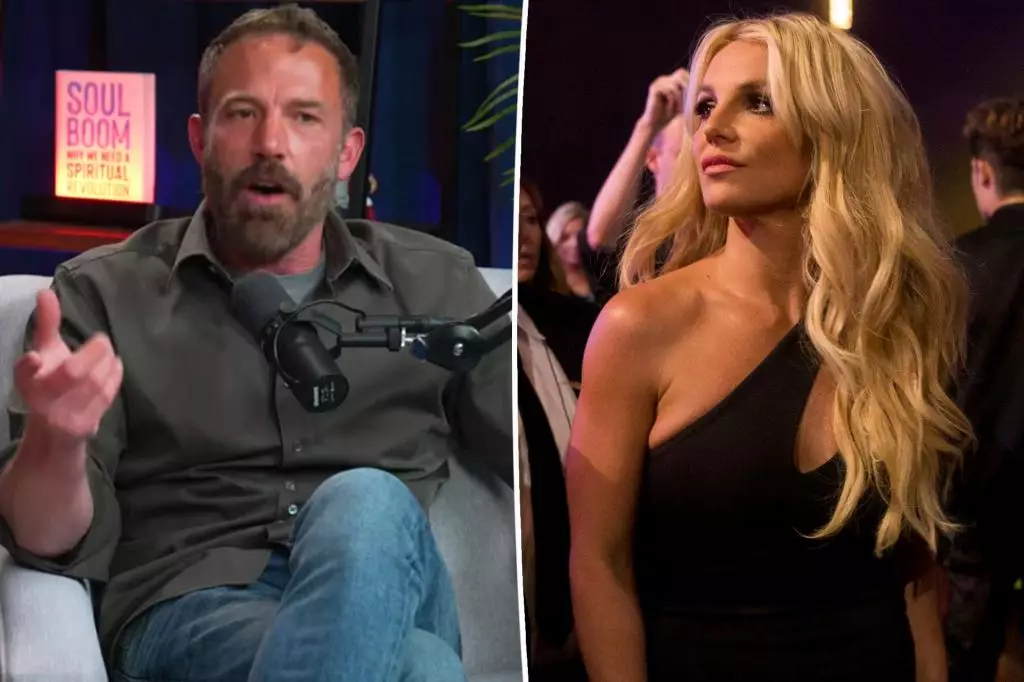In recent discussions that have garnered significant attention, Ben Affleck articulated a perspective on the relentless harassment Britney Spears faced during one of her most trying periods. On the podcast “This Past Weekend With Theo Von,” Affleck expressed a genuine empathy that resonates not just as a celebrity observation, but as an ethical commentary on societal behavior. His insights compel us to rethink our collective responsibility towards luminaries who become the focal point of public scrutiny.
Empathy Amid Celebrity Culture
Affleck’s admission of having empathy for Spears rings crucial in a world where celebrity culture often eclipses the individual’s humanity. He painted a vivid picture of Spears being subjected to an intense media frenzy at a time when she seemingly struggled with personal demons. It’s a reflection that many of us may forget; celebrities are, at their core, human beings navigating their realities while under a microscope. Affleck’s candidness invites the public to reconsider its role as both voyeur and critic, recognizing the pain that underpins the tabloid stories that dominate headlines.
Moreover, the actor underscored a phenomenon of “collective cruelty” fueled by societal norms that thrive on drama and scandal. His observations speak to a broader moral dilemma surrounding the ethics of journalism and public discourse. Are we, as a society, complicit in these cycles of harassment, merely playing our parts in a tragic comedy? Affleck’s words challenge us to confront our collective behaviors regarding how we engage with public figures in their vulnerable moments.
The Toxic Impact of the Paparazzi
Affleck’s metaphor comparing celebrity treatment to “poking the tiger” encapsulates the often chaotic interaction between paparazzi and their subjects. The constant pursuit not only exacerbates the distress experienced by individuals like Spears but also distorts the public’s perception. Images captured in moments of agony are dissected and repackaged into sensational narratives, celebrating the fallout without considering the human cost involved. This relentless attention fosters a toxic environment that can push individuals to the brink, yet it often garners little reflection from those who consume the content.
Citing Spears, Affleck noted how public escapades often lead to a skewed representation of emotions—only the “growling animal” is visible, while the stressors that provoke such reactions remain hidden in the background. This illustrates a critical oversight in media and public perception. Instead of embracing compassion, there exists a tendency to sensationalize and mock, echoing a poisonous dynamic that disallows understanding or empathy.
Reflections on Recovery and the Conservatorship System
By alluding to Spears’ much-publicized struggles—her public breakdowns, mental health evaluations, and the oppressive conservatorship that controlled her life for over a decade—Affleck brings to light the severe repercussions of societal neglect. His commentary implicitly critiques systemic failures that allowed for such exploitation and mistreatment. The conservatorship that ruled her life from 2008 until 2021 exemplifies a larger issue: the paternalistic and often dismissive attitude society can take towards those battling mental health challenges, especially when they have been thrust into the limelight.
The contrast between Affleck’s experiences with vulnerability and the systematic oppression Spears faced under a conservatorship raises essential questions about our obligations to support mental health and personal autonomy. It’s a stark reminder that, irrespective of fame, struggles with mental well-being do not discriminate. This observation should ignite conversations about how we, as a collective, can foster an environment that prioritizes compassion over sensationalism.
The Cultural Repercussions of Fame
Affleck’s sentiments bring us closer to understanding the nuances of fame, particularly how public figures are de-humanized in the eyes of society. The cycle of negative media attention not only mistakes vulnerability for weakness but also perpetuates a philosophy that thrives on deriding rather than supporting. Through his reflections, Affleck serves as a conduit for cultural introspection; his narrative sparks dialogue about changing our lens from judgment to support.
These discussions highlight an evolving understanding of celebrity culture and push for a more humane perspective. For those watching from the sidelines, there’s an undeniable need to critically assess how our consumption of media shapes our empathy and influences the lives of those captured in its glare. Are we ready to embody the kindness that Affleck advocates, or will we continue to perpetuate cycles of cruelty?
